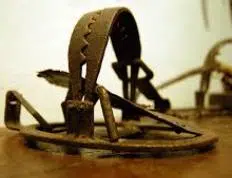The dictionary of the Royal Spanish Academy ( RAE ) recognizes a dozen meanings of stocks , a term that comes from the Latin cippus . The first meaning mentioned by the RAE refers to an instrument that allows a person to be immobilized and retained .
 This device is built with two pieces of wood that, when joined, have holes in the middle. In this way, a leg or the throat of the individual can be secured in said openings when both pieces of wood are joined together. The subject , therefore, cannot move freely.
This device is built with two pieces of wood that, when joined, have holes in the middle. In this way, a leg or the throat of the individual can be secured in said openings when both pieces of wood are joined together. The subject , therefore, cannot move freely.
There are, however, various formats of stocks. In ancient times, traps were used to hunt animals (holding them by one leg).
In the same way, we cannot ignore the existence of what is known as torture stocks. This was a device that was used centuries ago to, as its name suggests, torture people in order to obtain information or with the clear objective of getting them to plead guilty to a crime.
This type of trap caused the individual in question to be trapped by his hands and feet. Likewise, it must be established that, on many occasions, the person was placed in stocks in a public place so that people could carry out all kinds of humiliations on them. Thus, she could not only spit on him but also urinate on him, defecate on him, throw rotten food at him... What's more, she could even attack him.
In the most serious cases that have gone down in history, it has been known that people tortured with this type of stocks were mutilated, burned and even stoned to death.
For a long time this type of stocks was one of the torture systems most used by the Holy Inquisition along with others such as the saw, the cradle of Judas, the rack or the garrucha.
Nowadays there are also so-called rat traps. They can be used at home and, as its name suggests, its objective is to catch those rodents that lurk around the home. Among the best known are the spring trap, the glue trap, the bucket trap, the bottle trap or the plastic trap.
There are traps that are used to prevent the movement of a car . These restrictions apply to those vehicles that are parked in places where it is not permitted to do so. The car that has a clamp on one wheel cannot move: this forces its driver to pay the fine if he wants the authorities to remove the element.
A begging trap is a piggy bank that allows money to be introduced, but not extracted, unless the person has the key to open the box. That is why they are often used for collecting alms in churches .
Finally, a restriction imposed by a government on the purchase of foreign currencies is called an exchange rate . Through these types of measures, citizens cannot go to the exchange market, which experiences a kind of blockage. The idea of exchange stocks became popular in Argentina in 2011 .
